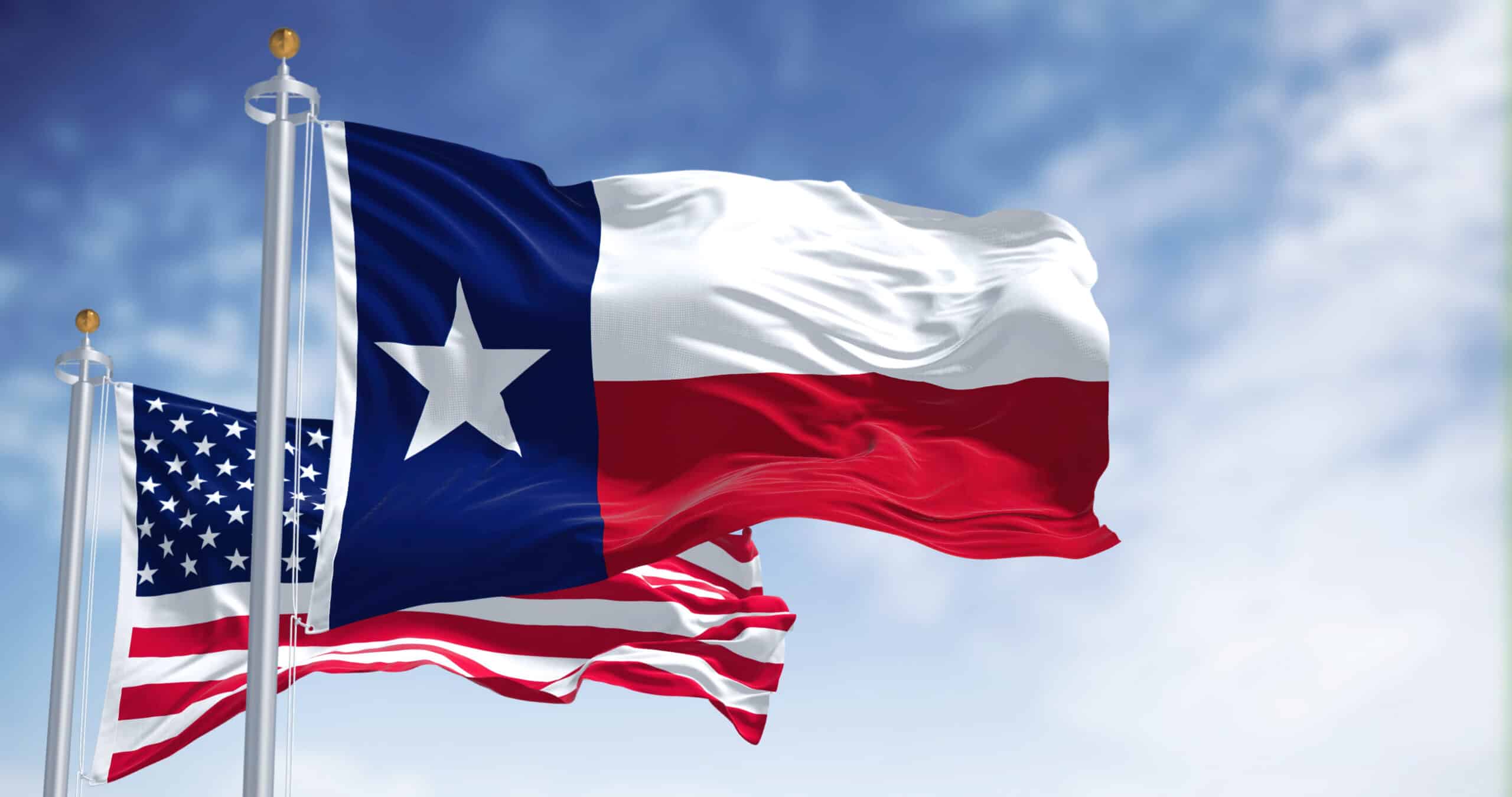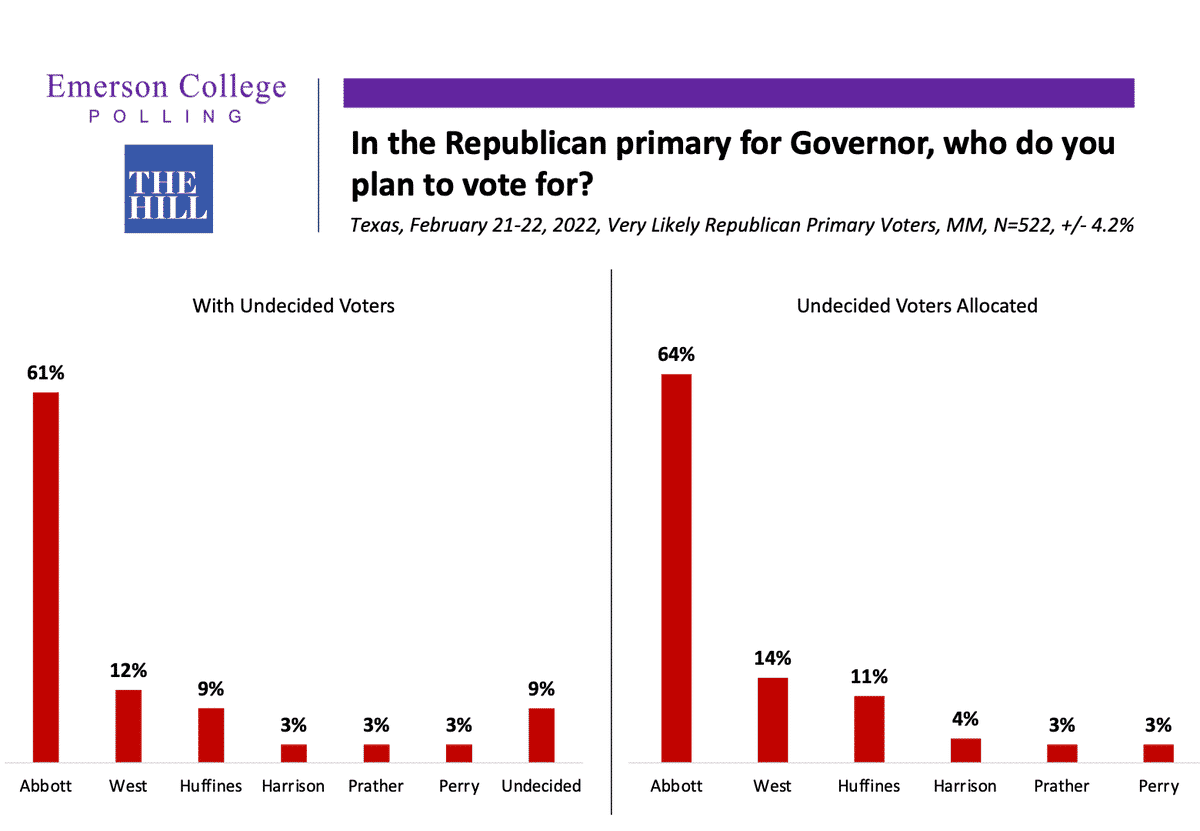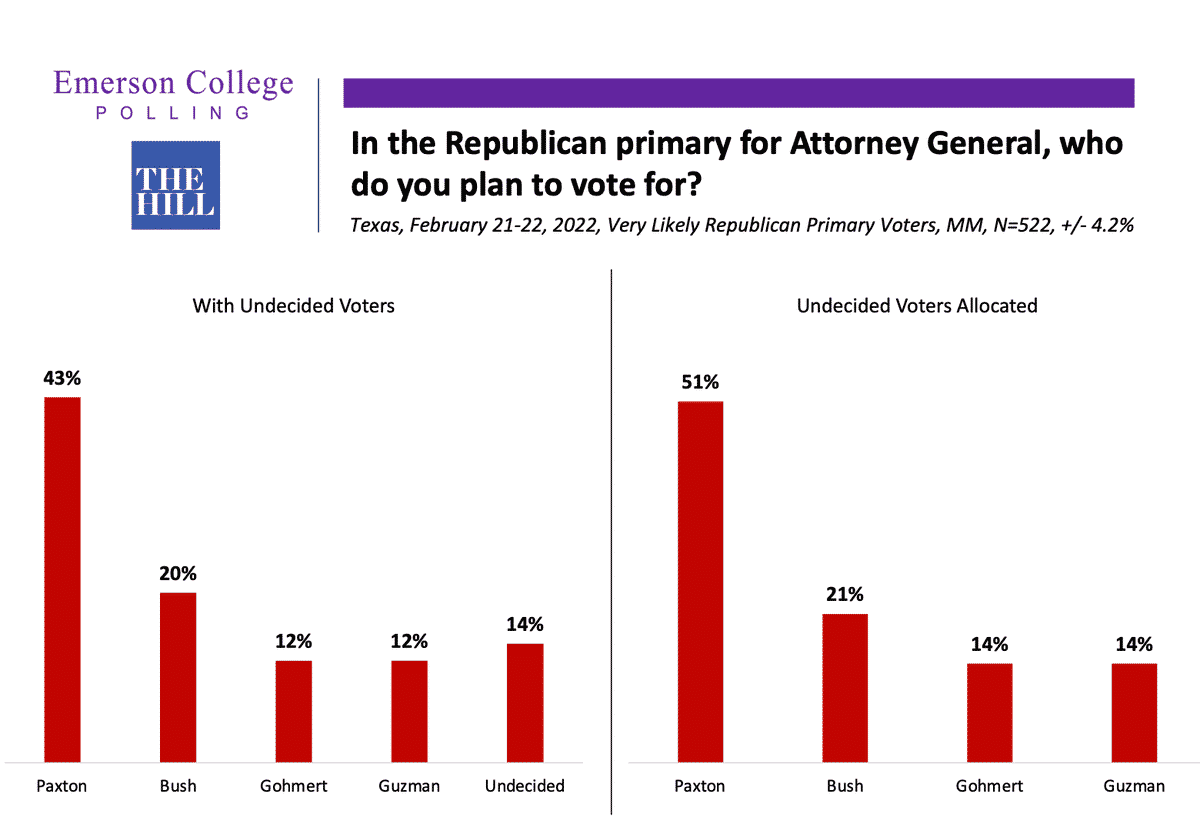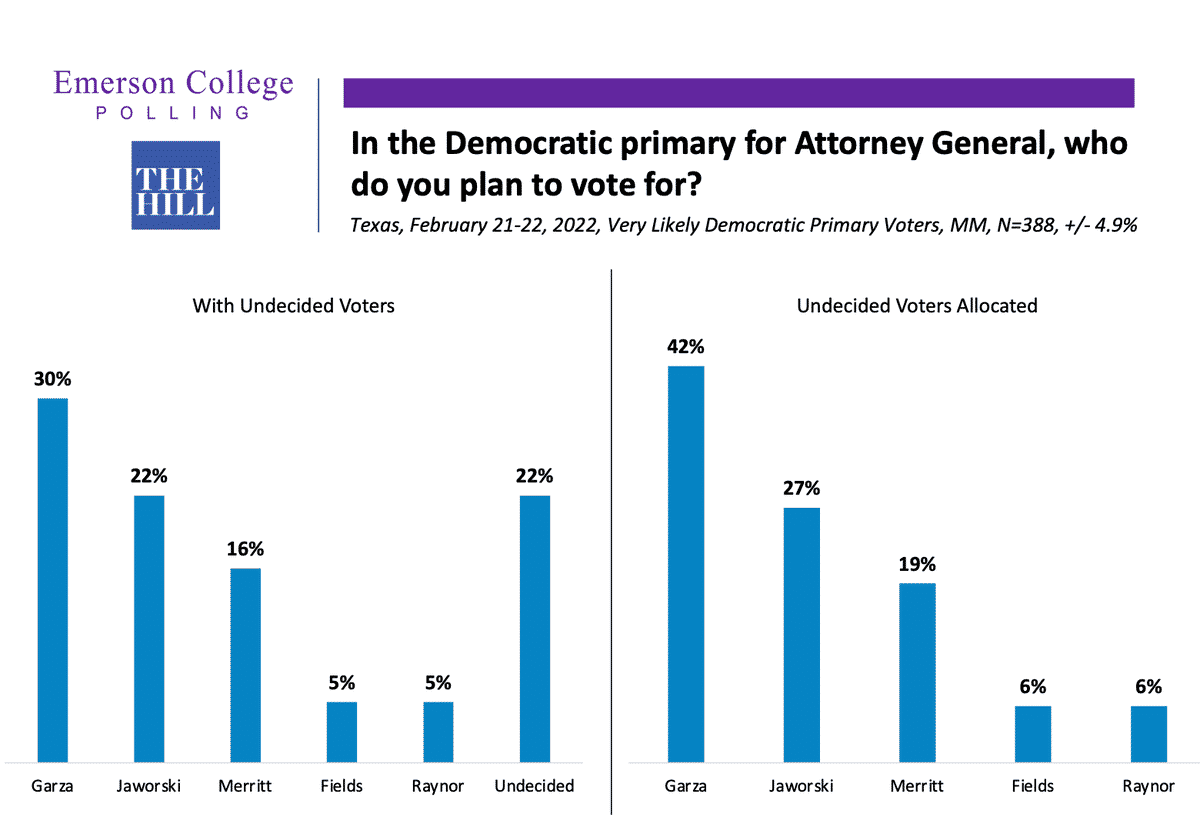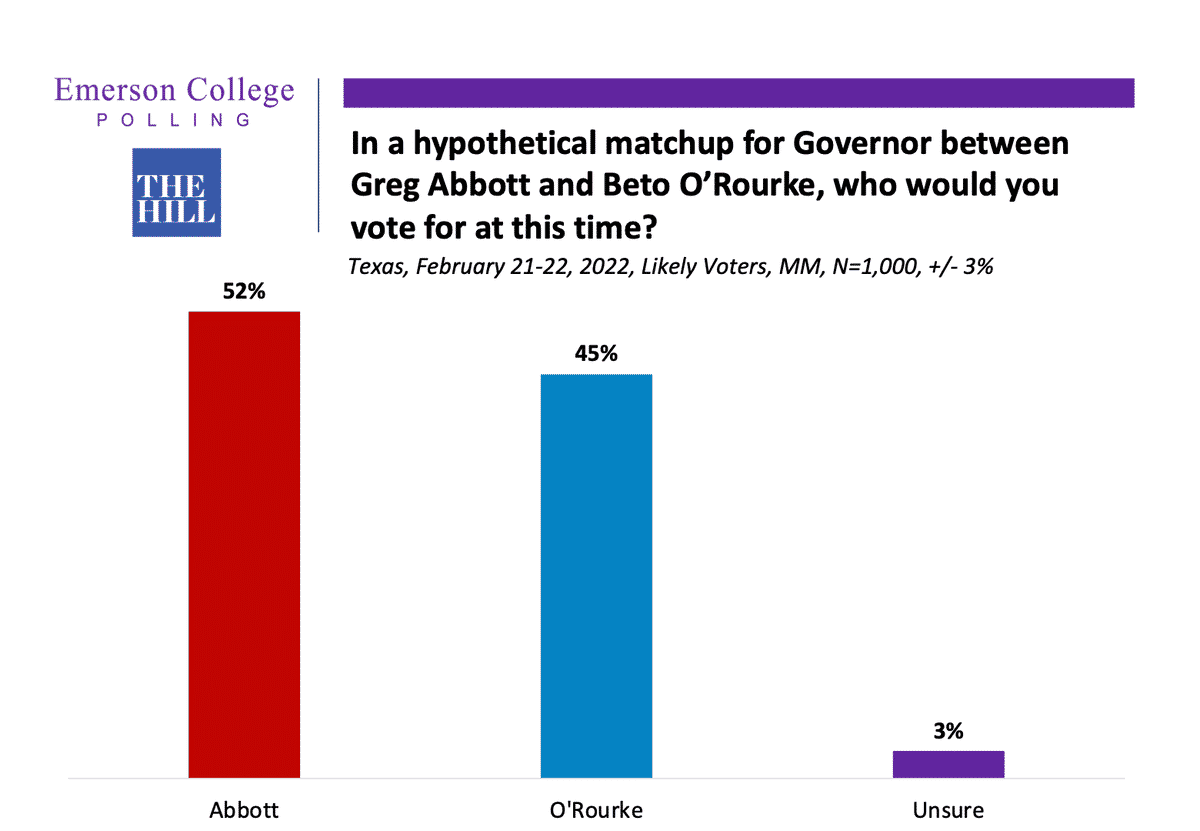Paxton’s indictment has little impact on Republican primary voters
An Emerson College/The Hill poll taken one week out from the March 1 Texas primary election shows incumbent Governor Greg Abbott ahead in the Republican primary at 61%. Other candidates include Allen B. West (12%) and Donald Huffines (9%), with no other candidate above 3%, and nine percent of voters still undecided. When undecided voters are allocated to who they are leaning towards, Abbott extends his lead to 50 points, at 64%, followed by West (14%), and Huffines (11%).
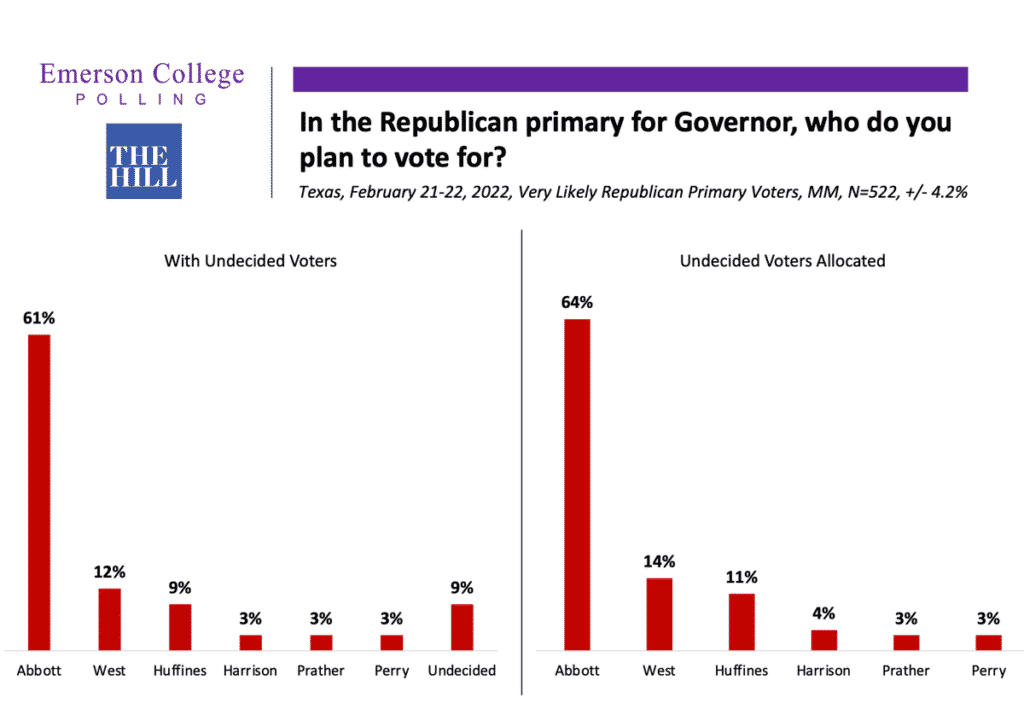
In the Republican primary for Attorney General, incumbent Ken Paxton leads with 43% of Republican voters’ support, followed by Texas Land Commissioner George P. Bush at 20%, Rep. Louie Gohmert at 12%, and former Texas Supreme Court Justice Eva Guzman at 12%. Fourteen percent (14%) are still undecided. When undecided voters are allocated to who they are leaning towards, Paxton expands his lead to 51%, which clears the 50% threshold needed to avoid a runoff.
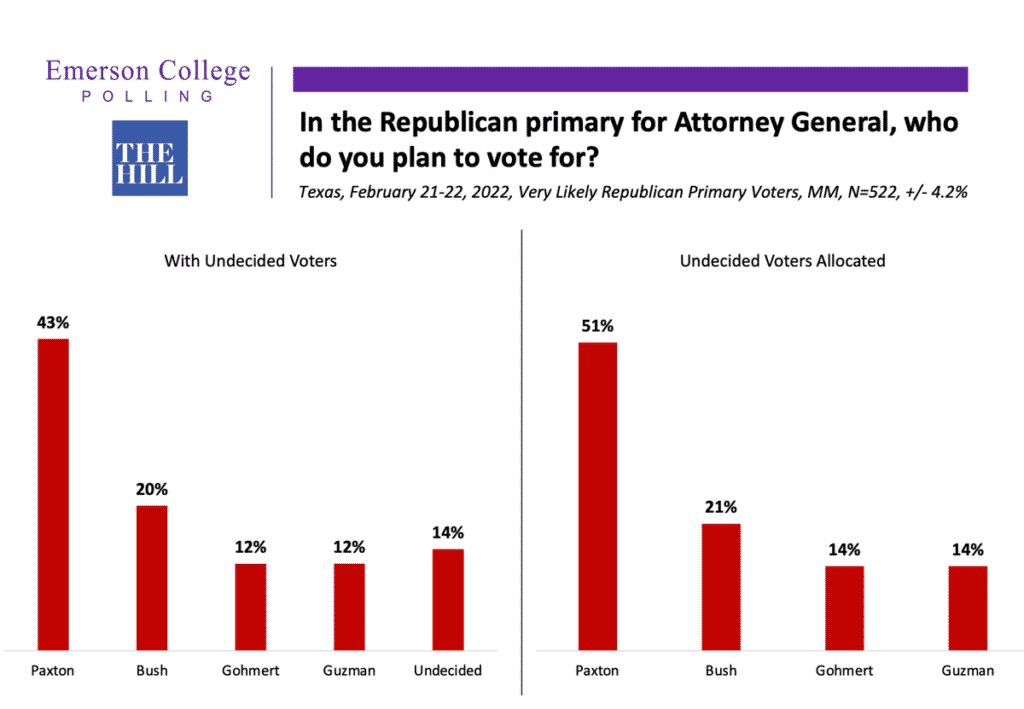
Spencer Kimball, Executive Director of Emerson College Polling (ECP) said, “Governor Abbott is poised to exceed the 50% threshold to clinch the Republican nomination and avoid a runoff. Attorney General Paxton is on the brink of capturing 50% and the nomination, but if he were to fall short of the threshold there does not appear to be a clear alternative in the runoff making him an early favorite to capture the nomination in May.”
When Republican primary voters were asked about the impact of Paxton’s indictment, a plurality (41%) say it has no impact on their likelihood of voting for him in the Attorney General Primary. Twenty-five percent (25%) say it makes them less likely to vote for him, and 23% say it makes them more likely to vote for him. Ten percent (10%) had not heard of this issue.
A plurality of Republican primary voters (49%) say Donald Trump’s endorsement makes them more likely to vote for a candidate. Thirty-five percent (35%) said it has no impact on their vote while 16% said it makes them less likely to support a candidate. ECP’s Director of Survey Operations Isabel Holloway notes that “among undecided voters that lean towards Paxton, a majority cited a Trump endorsement as a factor that would make them more likely to vote for a candidate. Since Paxton secured Trump’s endorsement in June, it may be what gets him over the 50% threshold.”
In the Democratic primary for Governor, former US Representative and presidential candidate Beto O’Rourke leads the field at 78%, followed by Michael Cooper at 5%, and Joy Diaz at 4%. When undecided voters are allocated to who they are leaning towards, O’Rourke is at 82%, followed by Cooper (8%) and Diaz (5%).
In the Democratic primary for Attorney General, the field is led by former ACLU lawyer Rochelle Garza at 30%, followed by former Mayor of Galveston Joe Jaworski at 22%, and civil rights attorney Lee Merritt at 16%. Mike Fields and S “T-bone” Raynor are at 5% each, and 22% are undecided. When undecided voters are allocated to who they are leaning towards, Garza slightly extends her lead to 42%, followed by Jaworski (27%) and Merritt (19%).
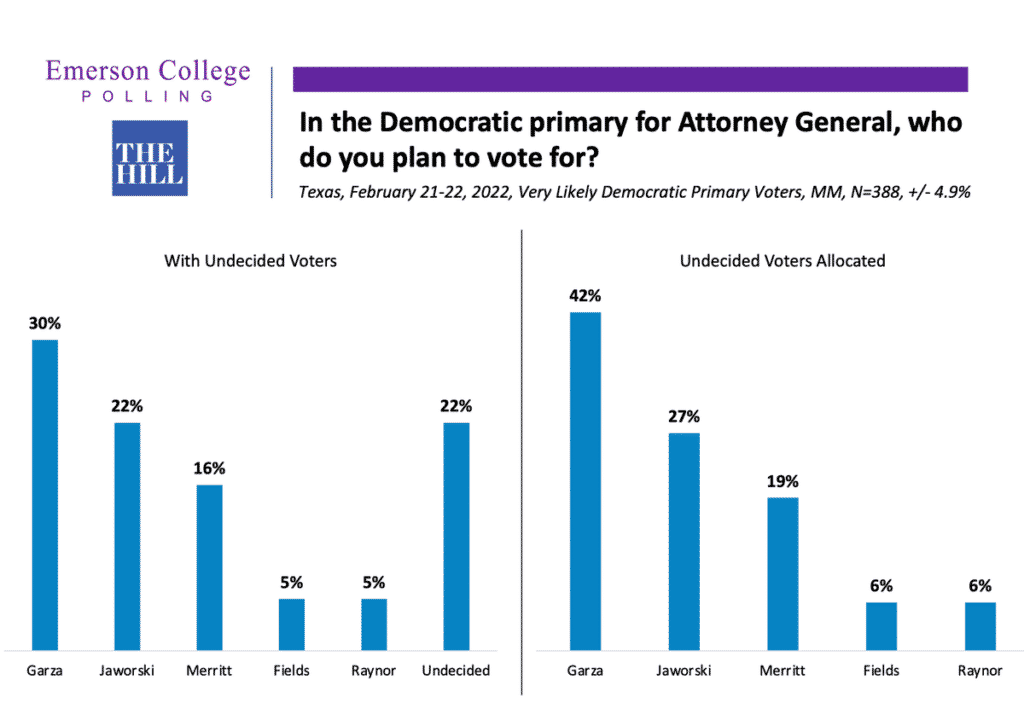
Kimball says “the nomination for the Democrat’s AG candidate appears more in flux with Rochelle Garza holding an advantage but short of the 50% threshold needed to avoid a run-off. There appears to still be room for either Joe Jaworski or Lee Merritt to join Garza in the runoff”.
When asked about the top issue facing Texas, the plurality (26%) of Texas voters say immigration, followed by healthcare (14%), inflation (13%), voting rights (12%), and Covid-19 (12%). Other issues included education (10%) and taxes (6%). Among Republican primary voters, immigration ranked first among 41%, followed by inflation (17%). Among Democratic primary voters, voting rights led as the top issue at 25%, followed by healthcare (22%).
Regarding the Texas electrical grid, an overwhelming majority (82%) of voters are very (47%) or somewhat (35%) concerned about the electrical grid in Texas. Fourteen percent (14%) are not very concerned and 3% are not at all concerned.
The majority (58%) of Texas voters think Texas runs fair elections, while 25% believe Texas does not run fair elections, and 16% are unsure on the issue. Major differences are seen between racial categories, with a super-majority (68%) of White voters believing Texas runs fair elections. In comparison, a plurality (44%) of Black voters say Texas does not run fair elections. Hispanic voters were more split: 48% believe Texas runs fair elections and 40% believe Texas does not run fair elections.
The majority (55%) of voters think Texas is headed in the right direction, while 45% say it is headed in the wrong direction.
President Biden’s job performance is underwater in the state, with a majority (53%) disapproving of the job he is doing as President, while 39% approve and 8% are neutral.
Looking towards the November general election, a hypothetical ballot test in the Governor’s race shows Governor Greg Abbott leading Beto O’Rourke 52% to 45%, with 3% unsure. The majority of male voters (57%) plan to vote for Greg Abbott whereas female voters are split: 49% plan to vote for Abbott and 49% plan to vote for Beto O’Rourke.
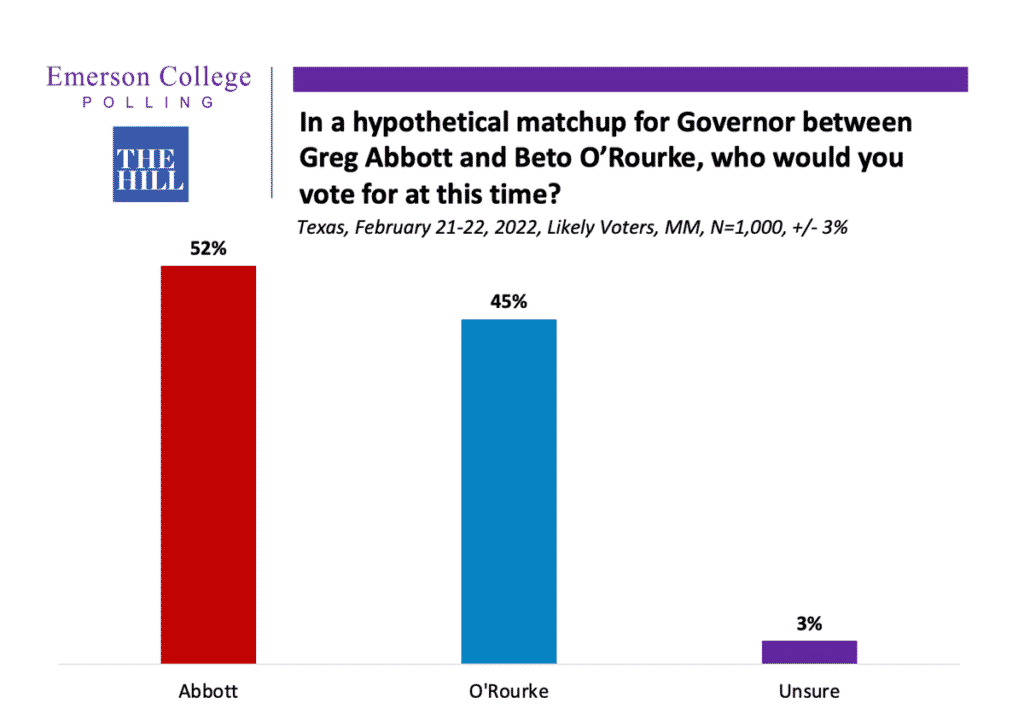
Caller ID
The Emerson College/The Hill Texas poll was conducted February 21-22, 2022. The Republican primary sample consisted of very likely voters, n=522, with a Credibility Interval (CI) similar to a poll’s margin of error (MOE) of +/- 4.2 percentage points. The Democratic primary sample consisted of very likely voters, n=388, with a Credibility Interval (CI) similar to a poll’s margin of error (MOE) of +/- 4.9 percentage points. The general election sample consisted of somewhat likely voters in Texas, n=1,000 with a Credibility Interval (CI) similar to a poll’s margin of error (MOE) of +/- 3 percentage points. The data sets were weighted by gender, age, education, race, and region based on 2020 turnout modeling. It is important to remember that subsets based on gender, age, party breakdown, ethnicity, and region carry with them higher margins of error, as the sample size is reduced. Data was collected using a cellphone sample of SMS-to-web, an online panel provided by Amazon MTurk, e-mail using an opt-in probability sample, and an Interactive Voice Response (IVR) system of landlines.
Follow along @EmersonPolling



